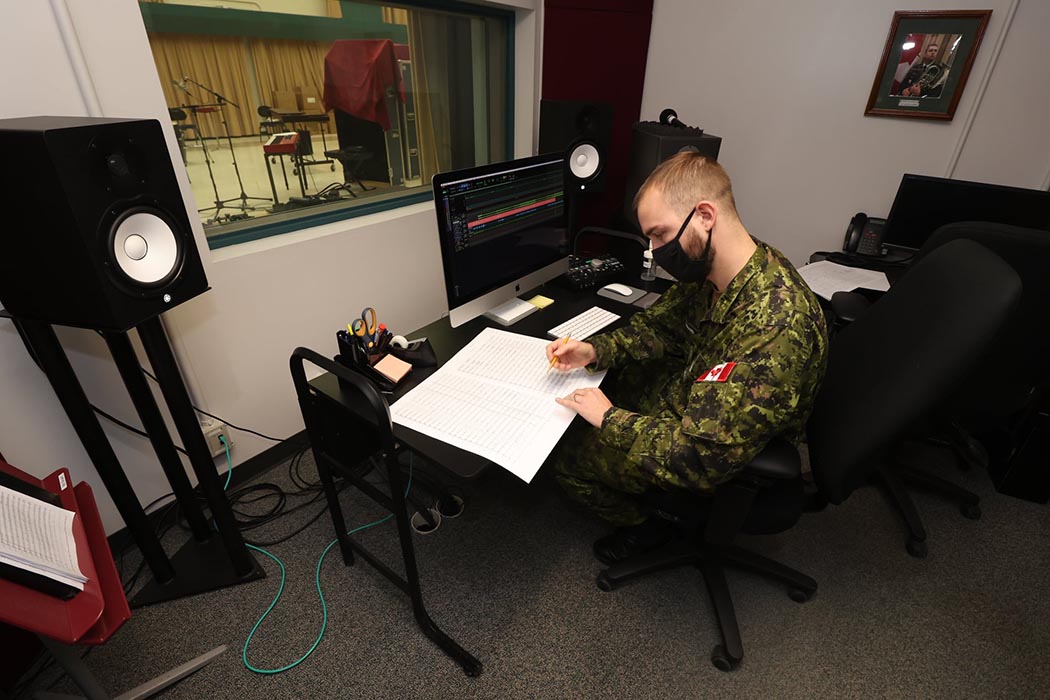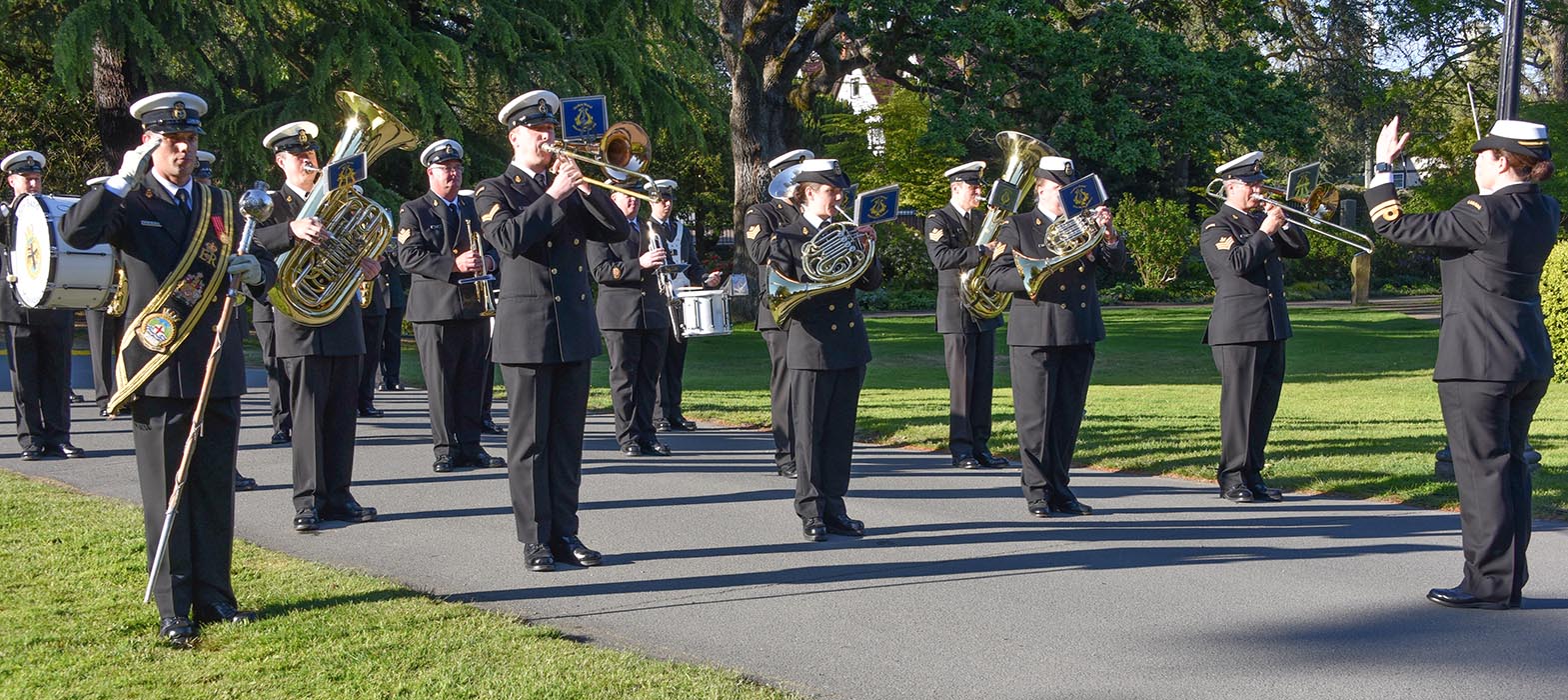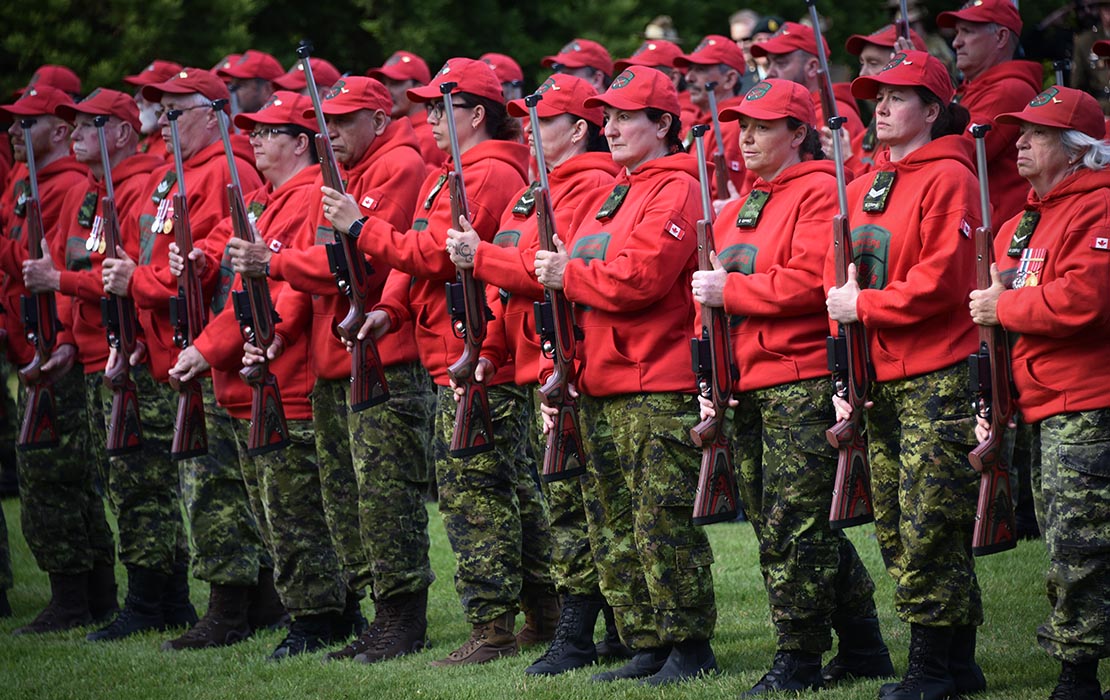Official march unveiled for Canadian Rangers composed by RCA Band musician
Article / June 13, 2022 / Project number: 22-0022
Note: to view additional photos, click the photo under Image Gallery.
By Canadian Ranger Lindsay Chung, 4th Canadian Ranger Patrol Group
“Vigilans,” which is Latin for “The Watchers,” is the motto of the Canadian Rangers, and this year, as the Canadian Rangers celebrate their 75th anniversary, it has also become the name of their official march.
Master Bombadier (MBdr) Julien Simard, Second In Command Operations of the Royal Canadian Artillery (RCA) Band, composed the march after winning an internal competition.
“Essentially, what happens sometimes is the Music Branch of the Canadian Armed Forces (CAF) will be approached by the Directorate of History and Heritage (DHH) with a request for new music to be written,” he explained. “In this case, the Canadian Rangers requested a new march for the corps, so DHH will then send out a request to all the Commanding Officers (COs) of the bands asking for volunteers to write this march. If composers are interested, it then becomes an internal competition.”
MBdr Simard, who has been composing since he was in high school, had done a similar competition in 2018 when the RCA Band was asked to provide a march for the 3rd Canadian Division Support Group formation, and his march, “Westward Winds,” won that contest.
For this march, MBdr Simard was very motivated, and he wrote the first draft in just two weeks.
“Essentially what happens when I start composing and start writing is that I'll start thinking about melodies,” he said. “I really try to stay with things that are whistleable or singable because when I think of a march, I think of the old-style World War I, World War II marches where they have a super simple melody and then the soldiers would end up writing their own lyrics to it and sing it for morale. I don't have lyrics for these marches; I think of a simple melody that I can then create something out of it.”
Once the draft is done, MBdr Simard will spend another week or so formatting the music so it's legible for the musicians.
“It's almost like writing a novel, I think – well I'm not an author so I guess I can't speak for them, but I feel like when they're on a roll, they have a frame for their novel … and with writing a march and writing music, you have to sort of also fit within that frame,” he said. “Marches have a typical format that you follow, so it's going to be like the first phrase, second phrase; the first phrase will sometimes repeat; in this case, I didn't. Sometimes, there is an introduction; sometimes there are little bridges here and there. There's always a second part to a march that's called the trio, where it modulates and changes it up a little bit, changes the feeling.”
MBdr Simard says he had no prior experience with the Canadian Rangers, so he read about what the Canadian Rangers do and tried to incorporate it into the march.
“The beginning starts off in kind of a minor feeling, almost dark, because one of the definitions I see from the Canadian Rangers is working in remote or secluded areas of the country, and that often can make you feel excited but scared, but also being at one with the nature that's around you,” he said. “In the trio, I completely change the mood, and I make it more of a major mood to lighten up the march. That's when I added another simple melody, something you can sing about, because I also think of the Canadian Rangers as people who work in teams and do things together, kind of having that unit cohesion, so I have a melody that has more of like a Western feel meets a Highlands Scottish feel, once again something that connects to the wilderness. In that trio section, I added a little bridge that was more of a call and response, which not only serves well musically, but it also represents the call and response of the wilderness.”
4th Canadian Ranger Patrol Group (4 CRPG)'s Honorary Lieutenant Colonel (HLCol), Major General (Retired) Ed Fitch, spearheaded this initiative.
HLCol Fitch knows how important marches are to military units, and he is excited for the Canadian Rangers to now have their own march.
“People who aren't into music or don't know anything about music, they don't always realize how powerful it is,” he said. “Music goes back to ancient times, it has been used to direct the unit in the field, but it evolved into identifying the unit wherever they are, and in modern times, particularly while marching, each unit is identified by its march.”
In the Regular Force and the Primary Reserves, every unit has its own march past, which is the music that is played when the unit is formed up and marching past a saluting base with a dignitary or special guest, explained HLCol Fitch, adding a unit's march is also played when the unit is recognized during formal Mess Dinners.
HLCol Fitch says it is not well known, but the Canadian Rangers are a Corps of the Army, although the Corps of the Canadian Rangers fell out of use. In the last 10 or 20 years, the Canadian Army has been reviving the use of the term Corps, he explained.
“We're expecting as part of the 75th anniversary, we'll bring back into use the title of the Corps of Canadian Rangers, and along with that, if you have a Corps, what is the march past for that Corps – they need music,” he said.
HLCol Fitch recalls it was pretty soon after he became 4 CRPG's Honorary Lieutenant Colonel in 2019 that he asked what the Canadian Rangers' march past was.
“People sort of looked at me like I had two more heads,” he said. “With Canadian Rangers, there's so much business, there is hardly any time for ceremony and you don't usually see Canadian Rangers on a parade square all spit and polished. I figure that's a good thing because units that are really good on parade squares, they're probably not that good on the land. But the idea caught on.”
Last year, a survey was created asking Canadian Rangers to share words that describe the Canadian Rangers. HLCol Fitch met an honorary Canadian Ranger from Ontario who is a composer and author, and she took those words and created a march for the Rangers, although it didn't end up being the official march.
“This was deep in COVID-19 at this point, and there were no bands actually sitting together playing music, so we got a computer to play her music, and we recorded it and sent it out to the COs and said 'how about this for a march,'” said HLCol Fitch. “They said 'we like the idea of a march' – the COs all come from the Canadian Army where they know about unit identity and the power of music and music as an identifier for a unit. They said 'we like the idea of having a march, but we don't want one just kind of pushed on us, so it has to be a competition.'”
So the Canadian Rangers approached the DHH, and through that process, the COs of all five Canadian Ranger Patrol Groups across Canada listened to a selection of marches composed by CAF musicians, including MBdr Simard's march, and together chose a favourite, explained HLCol Fitch.
HLCol Fitch hopes this march will help Canadian Rangers feel connected to each other and to the Canadian Army.
“The Commander of the Canadian Army has been pushing this down for years that we are One Army,” he said. “That's a very powerful concept, and I hope to see Canadian Rangers take their place in that Army. There are 5,000 Rangers, so that's got to be one of the biggest Corps in the Army. It's a big deal.”
It means a lot to MBdr Simard to have composed the march that will be played at parades and events for the Canadian Rangers from this point on and for the RCA Band to have played and recorded the march.
“The fact that it's going to be forever etched in CAF's history and in this case in the Canadian Rangers' history is just almost overwhelming, knowing that there are pieces of music that we play from hundreds of years ago that the bands hundreds of years ago would have been playing for their units, now this is something that 100 years from now is also going to be one of those things,” he said. “It's an overwhelming feeling that I never thought I'd be able to do. I'm lucky to be surrounded by musicians who can play the performances and then see what the thoughts and ideas in my head sound like in real life, and to be able to get feedback from them as well. I'm always going to be honoured to have my name attached to the Canadian Rangers.”


